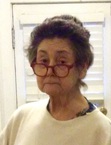Dean Robertson's Blog, page 8
May 7, 2016
Mothers “In the pupils of my eyes. . .”
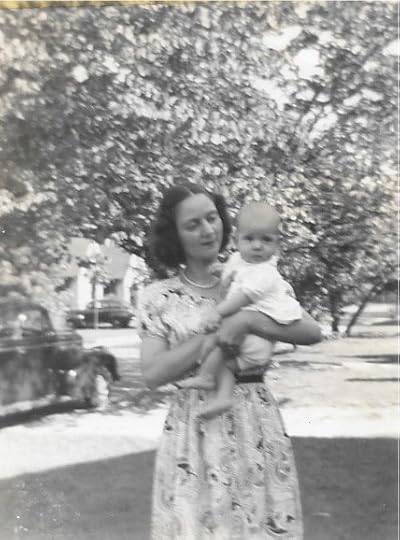
“Dear auntie will come with puja-presents and will ask, ‘Where is our baby, sister?’ Mother, you will tell her softly, ‘He is in the pupils of my eyes, he is in my [bones] and in my soul.'” (Tagore. “The End”)
I don’t remember at all when or where I read this line, written by the Indian poet, Rabindranath Tagore, but I know it was in my mind soon after my mother died in July of 1994. Nearly a year later, when her ashes were returned to me by the research center of the University of Alabama, Tagore’s words had become part of my way of thinking about her.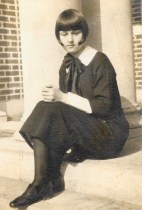
I kept those ashes in Michigan, where I was then living, until my son and I could take them to North Georgia to dig them into the dirt over my father’s grave. As I walked around my house and land in Michigan, which my mother never saw, I imagined I was looking at everything through her eyes–which were now somehow inside my own. She seemed, in fact, to be “in the pupils of my eyes.” And my world looked different as a result.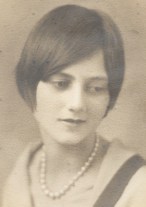
I have never lost that palpable sense of her presence–of her with me, of her in me. It is one of the ways I think of all the women in this family of women–six sisters, their mother–all dead for many years now–their daughters, my five cousins and I. .
Leonard Cohen wrote:
“You say you’ve gone away from me/but I can feel you when you breathe.”
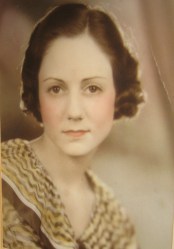
I am a granddaughter and a daughter and a mother and, as of a year ago, a grandmother.
I am sitting in my living room at 3:00 on a Friday morning, keeping the unpredictable hours of a seventy-year-old woman in questionable health, and looking at walls, deep window ledges, and tables covered with photographs of my mother and all her sisters and their mother and my father’s mother. I can’t imagine starting my day without them.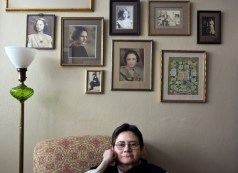
[image error]
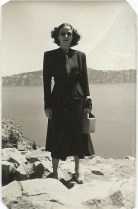
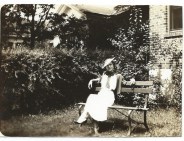
I never tire of looking at these photographs of my mother–Garner Inez Gentry Robertson–lounging on a park bench, clad in dark clothes and sunglasses on a rocky coastline somewhere I don’t know. She looks glamorous in these pictures. As a schoolgirl–possibly twelve and, I’ve been told, sixteen, she is just lovely. No matter how much I have moved in my gypsy existence, these photos have never been misplaced.. My mother, my aunts–all mothers to me at one time or another–their mother. I see them all. I have no way of thinking about Mother’s Day without thinking about every one of them. Without, in fact, thinking about all the mothers–my daughter-in-law; myself.
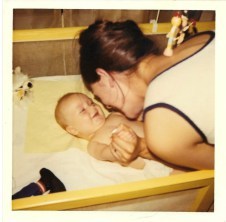

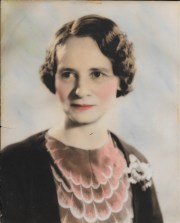
And I think about Lydia Roper and her houseful of children on Freemason Street in Norfolk, Virginia. Her great-granddaughter, Molly, says that one thing we know for certain about Lydia Roper is that her children adored her.
I would think that would be enough for any of us, celebrating our motherhood today.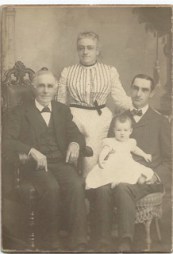
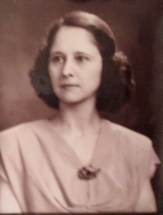
The post Mothers “In the pupils of my eyes. . .” appeared first on Dean Robertson.
May 4, 2016
Classic Movie Review: Actress and Activist-Marsha Hunt
 Classic Movie Review by Ellen Bunton
Classic Movie Review by Ellen Bunton(and her eager assistant, Meatball)
A Regular Monthly Feature
The first Wednesday of the month.
Wednesday May 4 2016
Born October 17, 1917 in Chicago, her family moved to NYC when Marsha was young. She pursued drama and signed a contract with Paramount Pictures in 1935. She made numerous pictures and in 1941 signed on with MGM after appearing in “Pride and Prejudice” (1940).
She continued her career, usually in support of MGM’s lead actresses and in 1947, Martha and her husband, screenwriter Robert Presnell, Jr., joined the Committee for the First Amendment. Members included Lucille Ball, Myrna Loy, Katharine Hepburn, Groucho Marx and many others. Some members, including Marsha, went to Washington, D.C., to protest the House Un-American Activities Committee (HUAC).
With the Red Scare (against Communists) running wild in Hollywood, Marsha and many others were unable to find work and were “blacklisted” soon afterward. Having appeared in over 50 films by 1949, afterwards she made only 9.
Thankfully, Broadway was not as paranoid and she found work on the stage. Later she would guest star on various television shows including “Star Trek: The Next Generation”.
Hunt wrote a song, “Here’s to All Who Love,” that is about love no matter what the gender. Also concerned with homelessness and hunger, she has given speeches across the States. She was founder of the San Fernando Valley Mayor’s Fund for the Homeless and served on the Advisory Board of Directors for the San Fernando Valley Community Mental Health Center. She was named Honorary Mayor of Sherman Oaks, California, in 1983.
Marsha has a documentary about her life called “Sweet Adversity” that was scheduled to premiere at a film festival and I hope it will be available on DVD.
She appeared at the dedication of the Mickey Rooney Memorial Square in Hollywood on June 1, 2015, and as I write this she’s still going strong at 98!!! What a gal!
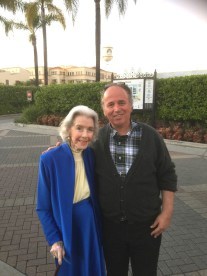
The post Classic Movie Review: Actress and Activist-Marsha Hunt appeared first on Dean Robertson.
May 1, 2016
Lydia and the Lawyers: The Fight for “Looking for Lydia”

Lydia and the Lawyers: The Fight for Looking for Lydia
In late February of 2013 I entered the Lydia Roper Home, an assisted living facility for women, to recuperate from a bad fall. During the eight months I was there, I led a study of the Old Testament.
When I was preparing to leave, in October of 2013, the women in the bible study asked if I would read the New Testament with them. I agreed and for over a year I spent my Wednesday mornings back at the Roper Home.
Sometime in March of 2014 I started writing about the bible study, about the bible, about the Roper family and especially about Lydia Roper for whom the Lydia Roper Home is named. I talked with the ladies about the writing and about my research into the Roper family; periodically I read to them from the manuscript, especially my descriptions of them.
I spoke with the Administrator at the Roper Home to ask if she had any records of the history of the Home. She said she did not and that she wasn’t interested in history.
On June 16 2014 I called the CEO of Virginia United Methodist Homes, which has managed the Lydia Roper Home since 1963 when the Roper family gave it to the Methodist Church, to ask the same question. We had a pleasant conversation, which included my description of the writing I was doing, and he sent me a book, published for an anniversary of VUMH, which included four pages about the Roper Home.
On June 17 I sent an email thanking him for his time and referring to “the story I’m trying to tell in my writing.” I never received a response.
In late February of 2015 I signed a contract with Koehler Books to publish Looking for Lydia; Looking for God.
On March 3 2015 John Koehler and I had an appointment with the administrator at the Lydia Roper Home to tell her about the book. I began that conversation with, “I have some wonderful news for all of us” and added that a percentage of any royalties would go to the Roper Home.
On March 9 both John Koehler and I received a special delivery letter from the CEO of Virginia United Methodist Homes This letter contained several errors in fact, including the claim that no one had “knowledge of the contents of this book.”
On March 15 The Virginian-Pilot published a feature article about my bible study at the Roper Home and my research into the Roper family.
On March 16 I received a special delivery letter from an attorney for VUMH suspending the bible study and requesting that I not enter the building.
And so began a situation that took nearly three months to resolve itself. It was an ugly process, a very ugly and painful time. Publication of the book was on hold. The letters kept coming, increasing or just rewording their accusations and demands. Families of all the residents were contacted and apparently both the families and the residents were told that I had returned to the Roper Home after my own residence there with the intention of uncovering confidential information for a book. HIPAA laws were invoked. The welfare of the residents was proclaimed a priority. Some family members considered hiring their own attorneys. The representatives of the Methodist Homes demanded access to my manuscript. An injunction was threatened should I try to publish.
I found an attorney.
Koehler Books stood by me. My attorney cut his fees in half. Several of the women from the bible study (who had left the Roper Home) stayed in touch; their families wrote letters of support. Three of Lydia Roper’s great-grandchildren wrote letters.
In mid- May the attorney for VUMH wrote a letter conceding that they could not, after all, find any legal objections to the book.
On July 24 2015 Looking for Lydia; Looking for God was released. John Koehler drove the thirty miles from his office to knock on my door and place in my hands the first hardback copy.
On September 12 2015 the Slover Library in Norfolk hosted the first of their new series of “book talks.” I talked about Looking for Lydia. The beautiful sixth floor space, with its glass wall that looks over the rooftops of historic downtown Norfolk, was filled with friends and family and with some people I didn’t know at all. The families of all the sons of Lydia and John Roper were represented. They listened; they asked questions; they bought books.
From mid-September until mid-November I travelled to Texas, Michigan, and Kentucky visiting friends and selling and signing books.
In the book I pose some questions–questions I would ask Lydia Roper if I found her, questions the bible ladies and I asked ourselves and each other: What did you want? What did you get? What did you lose? I didn’t think, when I wrote those questions, that I would be asking them about this small book, written from my heart about a group of women I had come to love, about a group of women who had come to love one another and me.
At the end of that awful time, which I sometimes thought would never end, I felt exhausted and defeated. I had lost the bible study; I had lost the friendships it had created; I was not allowed to enter the building where I had spent nearly two years of my life, not allowed to contact the women who had read those bible stories with me. The losses seemed overwhelming.
At the end of that awful time, I had a book. I had the book I had written for the ladies of the bible study and for Lydia Roper and her great-grandchildren, a book I dedicated to them. At the Slover Library I acknowledged the people “who stood with me through the terrible months of March and April and most of May,” and I held that book up high. At the Slover Library, a woman I didn’t know came up to me to say that her mother was in a nursing home, slipping into dementia, and that she was reading my book to her, “Mother never told me anything at all about her early life but now, as I read, she stops me every few pages to tell me another story. I feel as if I’m finally getting to know her, just in time.”
She thanked me.
What did I want? What did I get? What did I lose?
The fight for Looking for Lydia was too long, too ruthless, too much. In the end, they gave up, the book was published, it has made a difference to a few people. 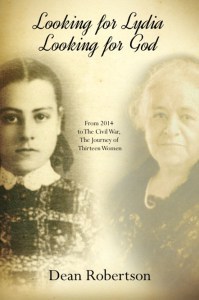
Did we win? I honestly don’t know.
Looking for Lydia, @ Amazon
Looking for Lydia @ Barnes & Noble
The post Lydia and the Lawyers: The Fight for “Looking for Lydia” appeared first on Dean Robertson.
April 24, 2016
Stories: Once upon a time. . .

“. . . red-faced with the pure, foolish joy of the whole thing.”
Last year, on the twenty-third of April, my first and almost certainly only grandchild was born. Sometime in June or July I started telling him this story. I have told it to him, adding a bit at each telling, every time we have been together since then. It has been magic for both of us.
It is our story. No one else has heard it.
This year, for his first birthday, I put together a book of photographs. This story, written down for the first time, is the last page of that book.

“On ce upon a time, in a city by the sea, on a bright, clear Spring morning in the Year, marked on many of the calendars as 2015, this world moved aside to make room for an unexpected person.
Once upon a time, in a city by the sea, on a clear Spring day, already filled with sunshine just past dawn, this old world looked around, then stepped just a little to the side to make room for an unexpected person to be lifted into his life.
And once upon that very same time, in a busy port city close by a large, sparkling sea, on the twenty-third of April 2015, 451 years to the day after William Shakespeare was born in Stratford-on-Avon, this funny, wise old world, this pretty amazing old world, surveyed the situation and took a decisive step aside to make a space with room enough for an unexpected boy to be lifted right up into the beginning of his great adventure.
And, although this boy was entirely unexpected, still he was longed for, waited for, anticipated, and in a large room close by where his lifting would occur, there were the people who, though not expecting him, still–after all–were waiting.
So all those waiting people, though not exactly expectant, sat together in a large room, close by where the boy would be lifted, and their waiting wasn’t long at all. It wasn’t long at all until the boy’s father sent out the first photograph, taken just minutes after the boy arrived, howling into the world, howling his arrival into what was at that moment his world. Howling with life, ‘Here I am. Send me.’
And after they had waited, after months and hours when they had not dared to expect, the boy had arrived, red-faced with the pure foolish joy of the whole thing. And those waiting people, who had perhaps already begun to suspect, now knew that the boy would change everything, would alter the landscape.
And the boy, brought in to the large room, was among them now, looking-frankly-not much like a changer of worlds-and yet so very obviously exactly that. This baby boy—his name, “Baby Boy” printed on his hospital bracelet—looked remarkably like the other babies. And his parents, with all good intentions, his adoring, joyous parents, were very, very tired, too tired in fact for naming. So it was that, only sometime during that magical first night, this shifter of ground, this transformer of lives, this ordinary baby boy, became in a heartbeat: Vaughn Michael Pollard.
The adventure had begun.
Once upon a time, in a city by the sea,
on a clear, bright spring morning. . .”

Happy Birthday, Baby Boy.
The post Stories: Once upon a time. . . appeared first on Dean Robertson.
April 19, 2016
A Guest: Three Poems by Deborah Lass
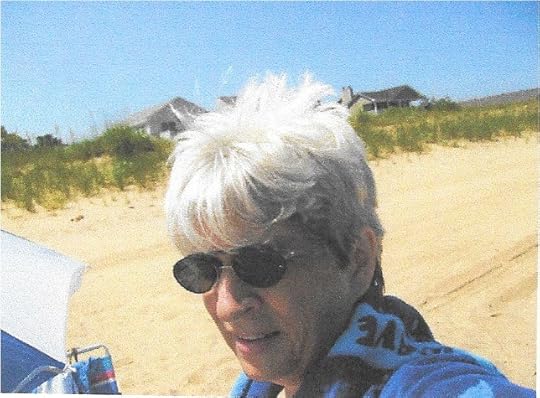
A Reigning Faith
By Deborah Lass
As the storm moves away
a bird nearby sings
God is
l am
You are
We are
Faith reigns
Freedom flows
Wind blows
We walk
We run
We stand
We sit
We come
We go
We are all of the same one
Good
God is good
God is love is hope is
Happy happy
Joy joy
FRACKING US
By Deborah Lass
what the “F” is going on here
I mean come on
FRACKING!?
WHICH BILLIONAIRE HIRELING THOUGHT OF THAT ONE
FRACKING…
“SHUT THE FRACK UP!”
“FRACK YOU!”
“NO FRACK YOU”
are they all on crack?
a cunning baffling powerful addiction
enablers everywhere
HOLDING HANDS WITH THE DEVIL
they’re fracking us
got us over a barrel all right
until
the entire planet implodes
or
unless
we say NO
to the MONEY GOD

A Word About Immigration To The United States of America
(or English only)
By Deborah Lass
KINDERGARTEN hmm German,not English
Patio oh Spanish not English
Chandelier wait a minute that’s French
we’ll need to create a new word for leprechaun
and we’d better hurry or we won’t be able to celebrate St. Patty’s Day
If we keep this up we’ll need a whole new Dictionary
maybe we could get Google to write it- remember when Spam was food in a can
you could slice it and fry it with eggs –
eggs and Spam- How Monty Python of me-oh now we’re talking English!
yet in England- a tinkle means I’m gonna call you on the phone
while in America a tinkle is a whole other meaning
we use the French word toilet in America (by the way this country
was named for Americus Vespucius,
the Latin derivative of Amerigo Vespucci,an Italian)
get my meaning
In The Beginning
there were the Algonquin,the Iroquois, the Ojibwa…
no one named Smith or Brown-wait a minutedidn’t a Captain John Smith mix it up a bit with a non-English speaking native before
America became America?

Debbie Lass was one of the first people I got to know when I moved to Norfolk. She is active in the writing community in the area and is well known for her kindness, her generosity of spirit, and her support of other writers.
When I asked her to write what she would most like people to know about her, she sent me this:
“I write and publish books–poetry, and children’s so far. I participate in book festivals and OPEN MIC events; my first book has been sold locally, in D.C., and in North Carolina. I have read with singers, musicians, and have been blessed to have read with the Friends of Tidewater Folk Music–the first poet to do so.
The summer of my 60th year, I played tennis for the first time in about 30 years and loved it. I enjoy the beach, kayaking, hiking, and road trips for a day or whatever. My favorite shopping times are Farm Markets, library book sales, craft shows, yard sales and thrift stores. I have a fondness for My Father’s Pizza, tomato sandwiches with cheese and ranch dressing on a croissant, potatoes–mashed, fried or roasted, and chocolate chip ice cream. I am grateful to God for the love of friends, family, neighbors, my most recent co-workers, and my support people. I am grateful for all goodness, grace, mercy, love, and especially for having had a change of heart, mind and attitude. And oh, I am a PBS fan!
Among my favorite books are hope for the flowers, by Trina Paulus; Around the Year With Emmet Fox; Now Is The Time To Open Your Heart, by Alice Walker; Fried Green Tomatoes, by Fannie Flagg; Zorro, by Isabel Allende; Red Bird, by Mary Oliver; The Earth Speaks, by Steve Van Matre and Bill Weiler; The Loop, by Nicholas Evans; The Zoo Keeper’s Wife, by Diane Ackerman; The Education of Harriet Hatfield, by May Sarton; All the Way Home, by David Giffels; and Spirit Walker, Poems by Nancy Wood and Illustrations by Frank Howell.
With a special thanks to The Shakespeare Fish and The Happy Goat.”
You can contact Debbie at
debbielass@gmail.com
The post A Guest: Three Poems by Deborah Lass appeared first on Dean Robertson.
April 18, 2016
Authors: Steil and Robertson~~Editing, Eating, A Cat

The Not-Quite-Sunday Blog
(Close, but no cigar)
Michigan in October 2015

On Friday morning April 15, 2016, Rachael Steil will get off a plane in Norfolk, Virginia, having travelled from Grand Rapids, Michigan, for a second time on behalf of her book, Running in Silence. She should walk in my door by 11:00. We will give ourselves a couple of hours to decompress and visit with a friend, and by 2:00 we will have locked the doors, turned off the phone, and begun our reading aloud of Rachael’s book, polishing and correcting as we go. We will have until 4:00 on Sunday afternoon–when she will leave for the airport–to complete the work. We are confident we can do it. We are both hard workers; we are both more than a little compulsive. It’s a useful combination for the task at hand. We’ll make it.
A SERIOUS ADDENDUM:
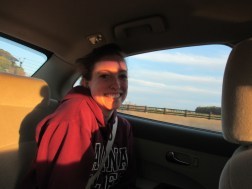
RACHAEL ARRIVES–EVENTUALLY
Rachael overslept, missed her flight, arrived at 7:00 PM on Friday. And we didn’t quite “make it,” although we came darned close!! We actually did get through the manuscript, the Worksheets, and a query letter–in a preliminary way and in between food, a walk, and Rachael’s growing relationship with my cat, Isaac. We will wrap things up in our respective homes and by phone during the coming week. Then it’s off to the races with a publication date set for the fall.
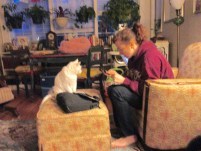 First Things First: Rachael renews her acquaintance with Isaac
First Things First: Rachael renews her acquaintance with Isaac
Rachael is the daughter of a friend of a friend, and we were “connected” by my friend in 2014. We looked at her manuscript then and I read a few chapters and offered some general suggestions and that was that. In October of last year we finally met in person when I flew to Grand Rapids to talk about my own book, Looking for Lydia; Looking for God.
I don’t remember the day she sent the email asking if I would edit her book. My notes tell me I spent my first two hours reading the Prologue and Chapter One on the 13th of February. On the 31st of March, we completed our preliminary work on the book and decided we wanted one more reading and Rachael decided to fly to Norfolk to do that in person.


Friday night: Cogan’s Mediterranean Pizza: Large
Since her first trip to Norfolk, only three months ago, Rachael has been busy. She left here with a head filled with information, ideas, suggestions–for her book, for her blog, for her life as a member of the community of writers–really almost too much to sort out. Rachael sorted it out.


All Day Saturday

Saturday night: Salmon and Vegetables

Sunday afternoon: Still Working
A Monday Report:
Rachael Steil, age twenty-four, should have landed in Grand Rapids at 11:00 last night; she has a full day at her job today.
Dean Robertson, age seventy, was in bed before 8:00 PM, slept until 6:00 AM, and is seriously considering a nap at 9:30.
Rachael and I will both have done our “homework” in time for our next phone editing session on Thursday.
Meanwhile, Isaac is waiting for Rachael’s return:

Read Rachael’s blog at Running in Silence
Contribute to her GoFundMe campaign
The post Authors: Steil and Robertson~~Editing, Eating, A Cat appeared first on Dean Robertson.
April 9, 2016
Book Review~~H. A. Dawson Writes Lots of Books! Here Is One


Girl On A Train: She is a stranger, but they all know her past (Luke Adams Investigates Book 1)
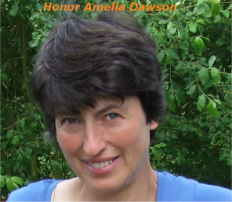
Honor Amelia Dawson
is a British writer living in the Fenlands of Eastern England.



She spent 20 years in Intelligence Technology (IT) as a software developer and systems analyst for one of the U.K’s largest banking groups.
And, according to Honor, this professional background has provided the understanding, patience and diligence to write full length novels.
In addition to a career in IT, travel to all sorts of places, and the completion of a breathtaking number of books, Honor and her partner, Doug, farm their own land and live a mindful life of alternative approaches to diet and medicine.

I have decided to print, in its entirety, this description that Honor sent me yesterday:
“We both tend our smallholding and grow 6 types of squash, cruciferous vegetables which include cauliflower, cabbage, garden cress, bok choy, broccoli, brussel sprouts and similar green leaf vegetables.Mange tout, sugar snaps, peas, sweetcorn, broad beans fine beans,runner beans french beans Lots of salad leaf inc mizuna, rocket and lambs lettuce little gem,Chinese leaf Certain slug resistant potatoes. Fruit 5 types of apples, 3 types of cherries, summer and autumn raspberries, red black and white currants, 3 types of gooseberry,jostaberry, tayberry, winter blackberry, 3 types of pear, grapes, peach. apricot, 3 types of strawberry, plums victoria, czar greengage cambridge gage and damson, nuts hazelnut, almond and walnut and figs!
That’s most of the food as vegetarian, Doug pickles and preserves any surplus or shares it with our friends.
It seems impressive, some years certain plants produce low yealds, but we do quite well.
What we eat is best explained by Doug who is the cook and never measures anything for the recipes.
We grow culinary herbs some medicinal herbs, some grow naturally which is convenient.”
Doug is, I understand, something of a genius in the field of creative technology, soon to be heard from as he decides to put his talents out into the world. While we are waiting, however, Honor tells us that
“his professional activities include WordPress website design, and graphics including book cover design. He provides graphics in various formats including PNG, JPEG, and in PSD or similar i.e. layers.”
And now we return to Honor Amelia Dawson, prolific author of mystery novels:
Her catalogue is approaching 21 books
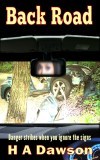



As Girl on a Train begins, the main character–Megan Armstrong–is recalling a violent episode with her partner in which she strugglesd to get free of his grip, turned, and fell to the bottom of a flight of stairs. She got away with a bad bruise, but as she looked back up the stairs, searching “for a consoling hand or gesture,” she saw that “gratification dripped from his pores and his eyes gleamed with pride.” This was a terrible experience and Megan’s haunting memory and feelings of helplessness plead with us for understanding and sympathy.
Why, then, did I have a queasy feeling about her almost from the beginning? For one thing, Dawson has set this up tidily with two descriptions of Megan gazing out the dirty train window. In the first, she finds great comfort in the landscape: “Beyond an intermittent hedge was a vast green space where horses grazed, cattle were driven along a country lane, and birds swooped overhead.” Sounds like all those Renaissance paintings of the Garden of Eden.
Only a few pages later, Megan sees that “next to the railway line were dilapidated industrial buildings with boarded-up windows, spray-painted walls with sketches and slogans, and disused car parks and wasteland overrun with weeds and broken concrete. Glass bottles had been smashed, littering the ground with small fragments, and cans and takeaway wrappers congregated in bushes and along a wall.”
I couldn’t avoid the comparison to Hieronymus Bosch’s paintings of hell.
Soon after this, we find Megan jumping restlessly from her seat to roam the aisles and when a man passing her in the opposite direction accidentally bumps into her, her response is, “Watch what you’re doing, you idiot!” Then she makes eye contact with an apparently harmless young woman who Megan imagines has “averted her gaze.” Megan goes back to her seat, “scowling.”
In every case, of course, the point isn’t the landscape or her fellow passengers but Megan herself and her erratic, overblown responses to everything and everyone she encounters.
The third person narrator presents us with a main character who is, at best, unreliable. We don’t quite trust her. Then a perfectly friendly man sits down and “her skin tingled with cold as a deep sense of familiarity emerged” He has no such recognition, but then it turns out she is moving to Rodley, the town where he lives. She then feels “not threatened but comforted” by his staring at her. Back and forth, chilled one minute, comforted the next.
Megan begins to experience a kind of deja vu and recalls details of this town she’s never visited.
The story in Girl on a Train is exciting, suspenseful, captivating; I believe this book could define the term, “page turner.” But its real strength, for this old English teacher, is in its development of complex characters who are neither heroes nor villains, who intrigue us and startle us and are never predictable.
And, finally, into this mix walks Luke Adams, himself not an uncomplicated character, himself the title character in an impressive series of mysteries that begins here– Girl on a Train: Luke Adams Investigates, Book I.
After that, we are bombarded with a cast that could easily overwhelm and confuse were it not for Dawson’s skillful introduction of just the kind of detail that makes each one clear and distinct.
But the roster of names is worth considering since much further exploration of who’s who and who does what to whom would constitute a Spoiler of the First Degree.
And so, we meet:
Ben, Larry, Joshua, Andrew, Verity, Saskia, Jane, Julie, Frank Fox, Ron, Imogen.
Who is important? Who is a red herring? Who can we trust? Who must Megan avoid?
Who is Megan?
Megan wades deeper and deeper into her own past as she strives to make a future in the now haunting village of Rodley, suddenly peopled by ghosts.
Read This Book.
It’s a thrill a minute, a puzzle, a twist around every corner in the almost mythical Rodley, as we follow the disturbing and disturbed Megan on her strange journey.
If you enjoy it as much as I did, you will move quickly to the rest of the Luke Adams mysteries. And be glad to have discovered them. This one’s a winner for all fans of psychological British mysteries. 
Follow Honor on
Read her and check out her books at
The post Book Review~~H. A. Dawson Writes Lots of Books! Here Is One appeared first on Dean Robertson.
April 5, 2016
Classic Movie Review: Thanks, Patty Duke
 Classic Movie Review by Ellen Bunton
Classic Movie Review by Ellen Bunton(and her eager assistant, Meatball)
A Regular Monthly Feature
The first Wednesday of the month.
Wednesday April 6 2016
Anna Marie Duke, but we knew her as Patty Duke. She was born on Dec.14, 1946 in Queens, NY. Coming from an unstable home of alcoholism and mental illness, as well as her managers later being her guardian, certainly gave her a lot to draw from in becoming an actress, and she didn’t waste any time starting out as a child playing on Broadway with Anne Bancroft in “The Miracle Worker”. She even had her name above the title later on in the run.
When the movie was produced, she and Anne Bancroft continued their roles as the young Helen Keller and the teacher, Annie Sullivan, that would change Helens life. Patty Duke won an Oscar in 1963 for Best Supporting Actress for her role in the ” The Miracle Worker”, and she would later win an Emmy in 1980 for the same story, yet Patty, all grown up, played the teacher role.
I remember that scene in the 1962 film when Patty, as Helen, first understood the word “water”, as Anne Bancroft, her teacher had been trying to communicate to her at the outside water pump. It is surely one of the most dramatic and uplifting scenes that I have ever seen on film.
Later, Patty would have her own television show, ” The Patty Duke Show” that ran from 1963-1966.
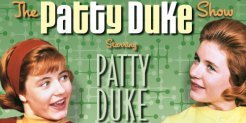
She also created a very memorable role in the “The Valley of the Dolls” in 1967 playing the boozing pill popping loud mouth Neely O’Hara in an all star cast.

However her most important work may have been outside of the Hollywood Studios where she spoke on behalf of the many sufferers of Bipolar.
She was the first actress to speak candidly of her Bipolar disorder and was interviewed on the Today show by Kati Couric. She also spoke in front of Congress and worked with the National Alliance on Mental Health for decades.
Patty Duke died recently at the age of 69. When someone dies it’s often asked how they touched the hearts of others? It’s clear she touched the hearts of her children and family, but it’s safe to say she reached countless others through her help with mental illness issues or through a wonderful performance on screen. I believe I speak for many when I say “thank you”.
The post Classic Movie Review: Thanks, Patty Duke appeared first on Dean Robertson.
April 3, 2016
Book Review~~Kathleen Varn, Unveiled

Kat Varn on a Halloween Dive

 Kat Varn, Author Photo
Kat Varn, Author Photo

Kat Varn, Teaching Belly Dancing in Jamaica
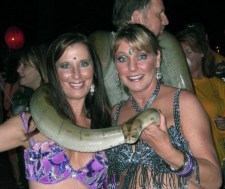
Kat Varn, Kelly, and A Friend Performing
What do you call a book like this? Kat Varn calls it a novel. Kat Varn admits it is her story–the story of an accidental belly dancer, the story of the wild adventure of a forty-eight-year-old mother of grown children who registers for a six-week belly dancing class for beginners at the local high school and finds herself on the road with her new troupe of friends.
It is possible to be changed–in the blink of an eye–by dance, by community, by an empty nest, by the sheer pleasure of movement and the liberation of your body that comes with mindfulness and more than a little courage. It is possible to be changed by joy.
Kat Varn seems to have them all.
In Ameera Unveiled, Ms. Varn gives us–herself: unvarnished, honest, nervous, brave, in a word-unveiled. Look again at the book’s cover. It is a study in fluid movement, in a breathless and unselfconscious surrender to pure sensation.

It is beautiful.
In the Introduction, she tells us:
“Although this is a work of fiction, I admit it was driven by my own desire to dance—but was told I couldn’t, shouldn’t, or was forbidden. . . Ameera’s pioneer spirit blazes a trail through the unknown land of Dance.”
Ameera Unveiled begins as our narrator introduces herself:
“The year 2006 was my year of change. According to the Chinese calendar, it was the Year of the Dog, the same sign under which I was born in 1958. Specifically, it was the Year of the Red Fire Dog—I thought of it as the Year of the Hotdog.
In 1982, I was a Pentecostal wife and a young mother and everything I knew about the Chinese zodiac came from discreet glances at paper placemats at all-you-can-eat Chinese buffets.”
And so, we meet her and prepare to hear her story, already drawn by her voice. We know that she is a woman with a wry sense of humor, no doubt forged in that life that didn’t include the Chinese zodiac or perhaps in a childhood where dancing was forbidden. But Kathleen, the writer, has presented us with a jewel of a main character who, whatever her scars, can invite us to laugh with her as we remember those paper placemats in all the Chinese buffets of our own lives, as we remember, too, all those forbidden things that have somehow become essential to life.
Unsure of herself, awkward, certainly not a natural, by the end of six weeks, here is our narrator:
“Tonight, as I headed home from class, I felt as though I belonged in the dance world in spite of life’s interruptions. Next week can’t be my last!”
By now we are turning pages just to find out what happens next to this narrator in Kat Varn’s novel who–we now discover–is called “Kat.” Their instructor asks them at the end of the last class what the class has meant to them:
Sybil smiled and turned to me. ‘Kat?’
I was shaking my head in confusion at this point. Who is Ameera? It’s now obvious she isn’t the narrator; that’s “Kat.” This is a novel, isn’t it, Ms. Varn? It says “A Novel” right on the cover, and again on the title page.
And, incidentally, a novel about dancing that’s a page-turner?
We read on, as Sybil, the dance instructor, follows with:
“’I’ve got a proposition for the rest of you,’ Sybil said. ‘How’d you like to take semiprivate lessons with me at my house? You three seem to have bonded, and if you’d like to keep going, I’d be happy to teach you.’
In the quiet room, we searched each other’s faces. ‘I’m in,’ Polly said first. ‘Me too,’ Cheryl answered. ‘What night?’
All eyes turned to me. ‘I’m in’ I said, hiding my stunned thoughts. I’d resigned myself to the idea of this being our final curtain call.”
And so, not far into Varn’s novel, the adventure begins. And we don’t have long to wait before we are let in on the secret of the book’s title. Ameera is
“. . . my new belly-dancing alter ego. . . I’d chosen the name because Ameera means queen in Arabic. My previous non-dancing life had been all about duty and responsibility. The idea of being a queen amused me. I’d decided that, when I stepped into Ameera’s costume, I wanted to abandon my call to watch in exchange for a pass to dance.”
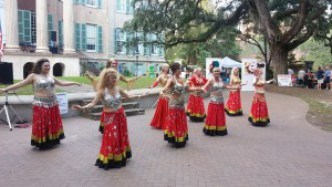
We also don’t have long to wait before we understand how important Ameera is to Kat Varn’s journey into herself:
“I wanted to be Ameera, with beautiful, glittery wings, so I wouldn’t be bothered with all the fear factors.”
As Kat’s dance life unfolds, she relies more and more on Ameera, but this new “relationship” is not without its struggles:
“‘Ameera. It’s only a thirty-minute show,’ I said, trying to summon my inner diva.
Ameera didn’t respond.”
We watch Kat as she lets go of the old armor and dons Ameera’s silks, but it is really only in the last third of the novel that the deep transformation occurs, and we read:
“I stared at the mirror and saw an exotic face staring back. She didn’t look a bit scared like the one melting down on the bed moments before. Her sparkly eyelids blinked over big, green eyes. Ameera had arrived. ‘How’s that?’ Sybil asked.

‘Wow, Sybil!’ I exclaimed. ‘I can’t believe that’s me . . . or Ameera.'”

With great delight we find that it is, indeed, both Kat and Ameera, that Kathleen Varn has created this new woman who somehow holds onto Kat’s warm, earthy stability and weaves into it the wry, delicious wildness of Ameera. Kat Varn has become a queen and, after all, “Ameera means queen in Arabic.”
Kat explained to me in a recent email why she couldn’t send some of the photographs I asked for:
“I don’t have a lot of photos of me up close dancing because a lot of times husbands are taking pictures of their wives. Mine is usually on stage being our prop janitor.”
In several places, Kat refers to her husband as her “soul mate,” and in her book’s Introduction, she writes,
“He made me his queen and supported my search for the little ballerina that got left behind in my childhood. It takes a special man to stand with his belly dancing wife.
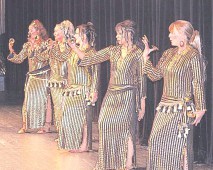
They can’t be afraid of a little glitter!”
Kat Varn has, in words borrowed from Scripture, run the race, and she has won the prize. She kept her heart grounded in love–of home, of children, of husband, of the life around her, while her eyes looked straight ahead toward a future and a self she had, it seems, always imagined. And here, between the pages of Ameera Unveiled, she shares that vision with anyone who doubts her own dreams.
In “Four Quartets,” T. S. Eliot wrote:
“Except for the point, the still point,
There would be no dance, and there is only the dance.”
Back from her tour and just off the plane, Kat tells us:
“I grinned and headed toward my supporting actor, dropped my bags, and let Steve scoop me up.
‘Welcome home, Ameera,’ my husband whispered. ‘Happy anniversary!’ ‘You have no idea,’ I said, basking in our embrace.
Ameera and I were home.”
The Still Point and The Dance.

Connect with Kathleen Varn and read more about her dance troupe.
Palmetto Oasis Middle Eastern Dance Troupe
Treat yourself to a copy of Ameera Unveiled at:
The post Book Review~~Kathleen Varn, Unveiled appeared first on Dean Robertson.
March 27, 2016
Hallelujah: An Easter Meditation
On this Easter morning that marks in many ways for many people the belief that out of death comes life; out of suffering, joy; out of despair, hope–or just out of the frozen earth of Winter, the mud and flowers of Spring– I found myself without a single idea for a Sunday blog.
My plan, as I crawled into bed last night, was to write a brief apology for the first Sunday I’ve missed since making this commitment to myself.
Then I considered a silly Easter Bunny blog, with lots of images of the usual eggs and bunnies and adorable children and, of course, the giant Easter Bunny at the Mall (I suspect the same person who appeared as Santa for Christmas). This could have worked as a lead to a biting criticism of the commercialization of religious holidays. There’s a terribly long list of these corrupted rituals.
I found I hadn’t the energy for biting criticism.
Several years ago a colleague emailed me a YouTube video of k.d. lang singing Leonard Cohen’s haunting song, “Hallelujah.” On the day it arrived I sat, mesmerized, and watched it at least twenty times. I have since sent it to many many people.
Leonard Cohen is one of my favorite poets and the one I followed when everyone else was panting after Bob Dylan. I am seventy years old and almost certainly qualify as a Leonard Cohen groupie. I had heard of k.d. lang but had never seen nor heard her.
When my only grandchild was about two months old, I introduced him to this video. He lay on my big bed and watched it on my laptop. He never took his eyes off the screen. We have watched it together at least once a week since then. He will be a year old next month, and I have my own videos of him in front of the laptop. Nothing else captures his attention in the same way. When he was small, he watched and listened. At eleven months, his mouth moves in a careful attempt to sing.
As I sat this Easter morning, the baby lying quietly against my chest, watching the video again, it suddenly came to me that, whatever my religious beliefs, on this first Easter of his life, this small boy is my Hallelujah.
The post Hallelujah: An Easter Meditation appeared first on Dean Robertson.




